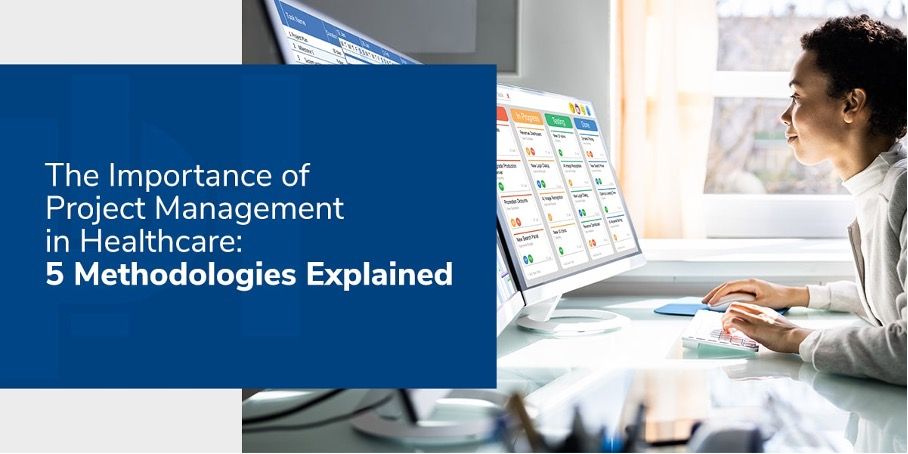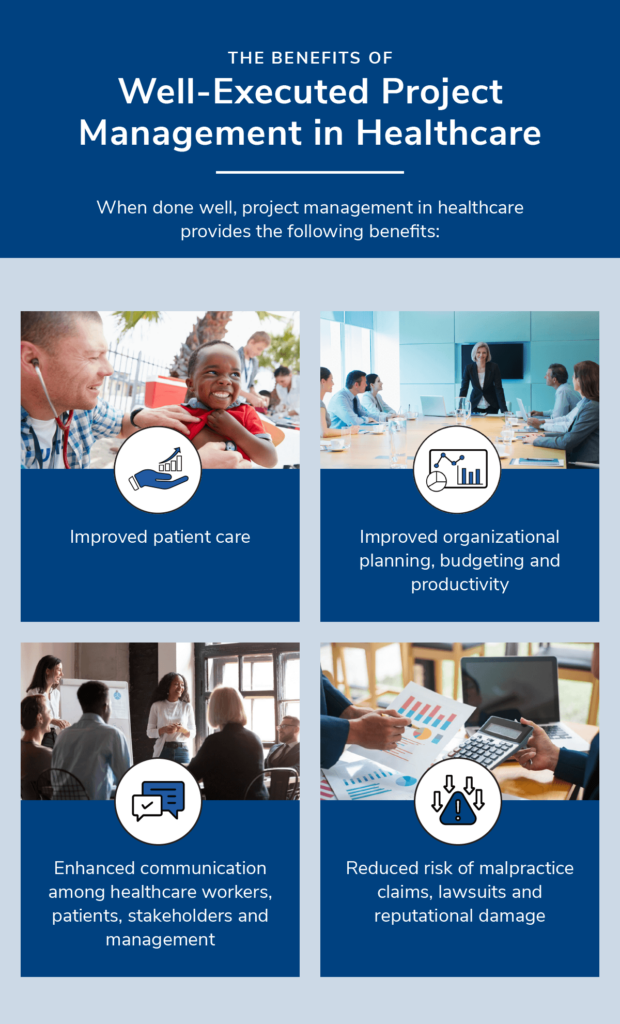
- Project Management
Home » Free Resources » »

Project Management in Healthcare: Introduction and Phases
- Written by John Terra
- Updated on August 16, 2023

Project management helps many businesses and industries, so seeing it in healthcare is hardly surprising. However, today’s healthcare industry faces significant challenges, including increased regulation, more pressure to cut costs, and shrinking staff. Adding to the difficulties, the healthcare industry (along with many others) is still reeling from the after-effects of the global pandemic.
Medical project management can help a healthcare institution run more efficiently, deliver quality patient care, and stay afloat during challenging circumstances.
This article covers the role of project management in healthcare, including a definition, the stages and methodologies of healthcare project management, the skills required for the position, the unique challenges facing healthcare project managers, and how you can become a healthcare project manager.
And now, let’s tackle that definition.
What is Project Management in Healthcare?
Here’s a generic definition of project management, which applies to project managers regardless of their industry. Project management applies knowledge, tools, skills, and techniques to accomplish project activities, ultimately achieving the organization’s goals.
The term “healthcare industry” covers elements such as hospitals, health systems, insurance companies, pharmaceutical companies, healthcare vendors, and medical groups, all of which rely on project managers to support and expedite business transformation initiatives.
Project managers grasp the concept of process groups and how they can impact a project. These processes are:
- Organizational Change Management
- Project Communication Management
- Project Cost Management
- Project Procurement Management
- Project Quality Management
- Project Resources Management
- Project Risk Management
- Project Scope Management
- Project Stakeholder Management
- Project Time Management
Good healthcare project managers implement policies that improve patient care, resolve operations issues, and build positive and healthy relationships with stakeholders. Here are the most common areas that healthcare project managers focus much of their energies and efforts in the form of projects:
- Resource allocation. Healthcare project managers oversee organizational spending habits and allocate funds to the necessary departments.
- Communication. Healthcare project managers emphasize clear, thorough communication between medical staff (e.g., doctors and nurses) and exchanges between physicians and patients. Healthcare project managers also ensure hospital administrators can access updated patient and insurance information, better maintaining health records and keeping the workplace organized.
- Productivity. Healthcare project managers delegate projects to staff members and evaluate their performance on the job. These projects are typically designed to increase staff productivity and enable medical personnel to handle sudden patient rises, especially during healthcare emergencies.
Well-planned projects provide organizations and businesses with the perfect way to tackle the above challenges. Once you see those three areas in terms of potential projects, you can see how that approach can yield excellent results.
With that in mind, let’s explore the standard stages of project management to understand better how to get any project off the ground and successfully completed.
Also Read: What Is Problem Solving in Project Management?
The Stages of Project Management
Typical project management (whether it’s healthcare or any other industry) breaks down into four distinct stages.
- The initiation stage. In this phase, the project manager defines the scope of the project and determines its purpose and extent. This evaluation covers areas like project costs, anticipated risks, and desired outcomes. Managers also encourage project teams to formulate feasible solutions for the anticipated challenges. Once this stage is completed, the managers send the plan to the organization’s leaders for approval and acceptance.
- The planning stage. Every project is broken down into tasks, and here’s where each task is outlined. First, each project step must be plotted, including assigning responsibilities, setting a budget, and establishing deadlines.
- The execution and monitoring stage. In this stage, the teams get to work, and their efforts are regularly monitored. If any aspect of the project needs to be modified, including changes to the budget or schedule, the project manager takes point, clearing all changes with upper management or stakeholders. This stage is particularly challenging in the healthcare industry, as more stakeholders typically must sign off on every step of the process.
- The conclusion stage. The project managers evaluate the project’s success, summarizing the outcomes and deliverables and any lessons learned. These findings are compiled into a document that can be handed off to the stakeholders and serve as a reference for future projects.
Methodologies for Project Management in Healthcare
Project management methodologies are popular frameworks that guide how the project team handles their projects (e.g., planning, execution, monitoring)—most organizations, including healthcare, use three popular methodologies.
- Agile. Agile emphasizes adaptability, communication, and speed. Teams carry out the different phases of the project in parallel rather than in a sequential approach, depending on close and continuous collaboration and communication to keep everything running on track.
- Waterfall. On the other hand, waterfall methodology is a sequential, linear-based approach where the project is broken down into more minor, clearly defined phases. Every project phase is meticulously mapped out, including tasks, deliverables, and deadlines, which must be completed before the team tackles the next step.
- Hybrid. As the name implies, hybrid methodology fuses waterfall’s big picture planning with the speed and flexibility of agile. So, for example, a team could use the waterfall method for the initiation and planning phases while turning to agile for the execution phase. Although the process takes a bit more planning, it’s an excellent way to ensure the project team enjoys the best of both worlds.
Also Read: What Is Quality Assurance in Project Management?
The Requisite Skills for Healthcare Project Managers
Upper management and stakeholders expect a lot from project managers. Consequently, project managers need a comprehensive set of particular skills to meet those expectations. Here’s a sample of skills every good project manager needs.
- Adaptability. Medical facilities experience constant change, and project managers must roll with those changes. These events could be health emergencies (such as a pandemic), budget adjustments, and personnel turnover.
- Leadership. By its very nature, project management is a leadership role. This role means that healthcare project managers must know how to motivate the staff, build productive relationships, make tough decisions, and help create a positive work environment. The medical industry is a demanding field known to burn out many a staff, so strong, empathetic leadership is critical.
- Problem-solving. Wherever you find a project, you encounter challenges and obstacles. Great project managers have good problem-solving skills. This soft skill includes keeping a cool head when everything around them collapses, finding solutions to problems and crises, and assigning the right people to address them.
- Communication. Healthcare project managers need robust interpersonal communication skills to help them communicate effectively with various professionals from diverse backgrounds.
The Unique Challenges of Project Management in Healthcare
Project management is challenging, but the healthcare industry is a complicated field that raises risk and complexity to exceptional levels. Here’s why the healthcare industry poses uniquely tough challenges to project managers.
- They’re dealing with lives. The healthcare industry is all about people, particularly their health and privacy. So the stakes are high, and so much can go wrong. Any organizational change can affect people’s lives and well-being. And if things go wrong, there’s a strong likelihood of litigation, which can ruin careers and reputations and adversely affect the organization’s continued existence and success.
- Heavy regulation. Since the stakes are so high (e.g., patient health and privacy), there are understandably many rules. Project managers must work within these regulatory frameworks while still delivering constructive results. These efforts usually result in increasingly complex projects and more stringent requirements.
- Ever-increasing costs. Prices keep rising everywhere, including in the medical sector. More insured Americans and a greater demand for cost-effective yet quality health services have helped those costs rise sharply. Project managers have a balancing act, trying to walk the line between quality and economy.
- The industry is constantly in flux. Service-oriented industries tend to experience more remarkable changes and have it happen more often. There need to be more healthcare professionals since these are the kinds of positions that technological solutions cannot simply replace.
- Excessive stakeholder oversight. Healthcare project management typically has many different stakeholders that they must answer to, including hospital boards, government agencies, etc. It’s up to project managers to navigate this sea of stakeholders and still deliver results.
Also Read: Best Project Management Apps You Should Consider
Summing Up the Best Practices of Project Management in Healthcare
The following are best practices that every good healthcare project manager must keep in mind:
- Streamline the process. Once the project management process is defined, it must be easy to implement and execute. Managers can use tools such as strategy management software that simplifies step planning and tracking a project’s progress.
- Be aware of relevant regulations and governance. Project managers need a solid knowledge of the unique requirements of the healthcare industry’s heightened regulations and governance.
- Expect the unexpected. If anything can go wrong, it will. Therefore, managers must be capable of updating their plans and budgets in the face of unforeseen circumstances.
- Communicate openly with all parties in the organization. Project managers should have a standardized, open planning process, gathering feedback from diverse departments throughout the organization. In addition, effective managers ensure that team members feel their voice is listened to and valued. Team members should be encouraged to speak their mind on potential issues or obstacles.
- Document results for future projects. Project managers should prepare a document summarizing the project’s roadblocks and their solutions, unexpected occurrences, project outcomes, and lessons learned. This process improves future project management processes and allows the team to take a victory lap.
How to Become a Healthcare Project Manager
Here’s a handy roadmap to help you become a project manager in healthcare. It’s a tough road, but ultimately worth it!
Gain a College Education
Healthcare project managers require at least a bachelor’s degree. Additionally, it would help if you learned how medical facilities operate and the terminology healthcare professionals use when caring for patients. Consider studying these subjects:
- Business administration
- Health administration
- Public health administration
Earn your Master’s Degree
While not mandatory, a master’s degree opens doors and helps you specialize.
Work in a Clinical Role
Experience is a great teacher, especially in the medical field. This hands-on experience can prepare you for a healthcare project manager position. Consider an entry-level position to learn about the industry, as well as to build a professional network. In addition, some degree programs may require applicants to complete a clinical internship before graduation, another excellent opportunity to work in the field.
Earn Project Management Certification
Like a master’s degree, certification isn’t mandatory, but it can boost your qualifications and appeal as a job candidate. Here are three popular and well-respected professional certifications:
- Certified Associate in Project Management (CAPM). This certification requires a high school diploma or associate degree plus 23 hours of project management coursework.
- Project Management Professional (PMP®). PMP requires a bachelor’s degree and 36 months of project experience. Applicants also must have a CAPM certification or 35 hours of project management training.
- Program Management Professional (PgMP). Candidates must have a four-year degree or PMP endorsement, plus at least six years of project management experience.
Now that we know how to become a healthcare project manager, let’s look at the healthcare project management salary picture and the future potential demand for medically-based project managers.
Also Read: What are PDUs in PMI? An Explainer
What’s the Salary and Job Outlook of Healthcare Project Managers?
According to Glassdoor.com , the average healthcare project manage5 salary in the United States is $107,961 per year, with a range of $64K at the low end and $184K at the high end.
The U.S. Bureau of Labor Statistics projects that employment of medical and health services project managers will grow 28 percent in the decade between 2021 and 2031, outpacing other occupations.
How to Get Solid Project Management Training
If this discussion on project management has inspired you to consider it as a career or just upskilling your current skill set, consider this valuable bootcamp in project management . This post graduate program in project management, offered by Simplilearn in collaboration with the University of Massachusetts and aligned with PMI-PMP® and IASSC-Lean Six Sigma, teaches you valuable skills needed to pursue a career in project management in healthcare.
Once you satisfy the PMP certification requirements, you get a certificate and membership in the UMass Alumni Association. In addition, you are awarded 146 Professional Development Units (PDUs) to help you keep your CCR current for future PMI-related certifications.
So, sign up today and enrich your project management skill set and chances for a more fulfilling and secure project management career.
You might also like to read:
Six Sigma in Healthcare: Concept, Benefits and Examples
Top 12 Project Management Books You Should Check Out
Understanding Scope in Project Management: Definition and Importance
9 Project Management Techniques and Tools That Actually Work in 2023
Best Project Management Software You Need to Have in 2023
Leave a Comment Cancel Reply
Your email address will not be published. Required fields are marked *
Recommended Articles

Career Prep: Tips for Gaining a Project Manager Certification
Discover how a project manager certification can boost your career. Learn about the benefits, types, and how to choose the right certification for your professional growth.

30+ Behavioral Interview Questions and How to Answer Them
Learn to craft answers that highlight your skills and experience. Prepare for your job switch with these common behavioral interview questions and answers.

What is Scope Creep in Project Management, and How to Avoid It?
What is scope creep? Understand this issue and how it can threaten your project’s success. Explore common causes, effects, and practical tips to manage and prevent it in project management.

6 Top Open-Source Project Management Tools for 2025
Manage your projects efficiently with the best open-source project management software tools of 2024. Our guide covers the top 6 free, customizable project management tools.

Top 8 Project Manager Interview Questions and Answers for 2024-25
Before you arrive for your scheduled interview for a new project manager position, it makes sense to do whatever you can to prepare for the

What are Project Management Frameworks and Methodologies?
At the heart of every successful project is one or more project management framework. In this article, we dive deep into these powerful tools and how you can harness them.
Post Graduate Program in Project Management
Learning Format
Online Bootcamp
Program benefits.
- 25 in-demand tools covered
- Aligned with PMI-PMP® and IASSC-Lean Six Sigma
- Masterclasses from top faculty of UMass Amherst
- UMass Amherst Alumni Association membership
- Who We Serve
- Program and Project Management
- Vendor Management Office
- Integrated Clinical Care Solutions
- System Integration and Selection
- Administrative Cost Savings
- Benefits Optimization
- Government Markets Required Documents
- Risk Adjustment
- Staff Augmentation
- ACA Plan Development and Expansion
- Dental Practice Management
- Addressing Health Disparities
- Managed Long Term Services and Supports
- Medicaid HEDIS Optimization
- NCQA Accreditation
- Quality Performance Dashboarding
- System Integration and Selection for Medicaid
- Stars Performance Improvement
- Conferences and Webinars
- Open Positions
- Working at ProspHire
- Our Purpose and Core Values
- Social Impact
- Workplace Awards & Certifications
- ProspHire History
- Facts and Figures
- Diversity, Equity and Inclusion
- ProspHire University
412.391.1100

The Importance of Project Management in Healthcare: 5 Methodologies Explained
Why project management in healthcare matters, 5 project management methodologies explained.
- Method 1: Waterfall
- Method 2: Agile
- Method 3: Six Sigma
- Method 4: Scrum
- Method 5: Hybrid
Healthcare is one of the fastest-growing industries in the United States. Over the decade, the Bureau of Labor Statistics (BLS) projects healthcare occupations to grow 16% , adding over 2 million new jobs to the economy. Recent U.S. census data shows that 22 million workers are employed in the healthcare industry already.
Utilizing project management is essential in such a massive industry that continues to grow at an astounding pace. Continue reading to learn more about project management in healthcare .
Besides the scale of the healthcare industry, other factors contribute to project management’s importance in healthcare.
One prominent factor is the stakes involved with patient care. There’s no denying that healthcare is an essential part of any society, ensuring its members can prosper. Further, healthcare is necessary whenever tragedy strikes. For these reasons, people depend on well-organized, quality healthcare services.
As healthcare expands and technologies develop, project management only becomes more necessary. Things like electronic health records, regulatory limitations and diverse stakeholders add countless processes and regulations around patient safety, privacy and quality of care that healthcare project managers need to be mindful of. Also, the many parties involved in healthcare interactions further complicate matters.
In any given healthcare transaction, notable parties include:
- Health insurance providers
- Government agencies
Whereas many other industries have more simplistic buyer and seller relationships, healthcare has added complexities. Thus, project teams must be diverse and adaptable enough to consider all views, concerns and party interests.
To summarize, healthcare project management is essential because of:
- Industry scale and accelerated growth rate
- Stakes involved with patient care
- Expanding technologies
- Increased regulations
- Diverse stakeholders
- Complex relationships are involved with healthcare transactions
When done well, project management in healthcare can provide the following benefits:
- Improved quality of care
- Improved communication among healthcare workers, patients, management and shareholders
- Improved organizational planning, budgeting and productivity
- Decreased risk of lawsuits and malpractice claims

Project management methodologies are established principles and techniques that project developers and managers use to develop, carry out and manage projects. Here are brief explanations of five of the most popular project management methodologies:

1. Waterfall
The waterfall method is the most straightforward, linear and traditional approach to project management. It consists of several distinct phases that flow one after the other, just like a waterfall. Project managers using the waterfall method wait until each step is complete before moving on to the next one. Each phase is mapped out with clear expectations and desired outcomes and the project team regularly documents progress throughout each stage.
A key characteristic of waterfall projects is the use of Gantt charts. Such charts provide a visual overview of the project timeline with information on how long each phase will take. The waterfall approach is excellent for presenting a project to senior leadership and stakeholders.
The waterfall technique is also ideal for projects that require a rigid structure. Still, they can present difficulties for the project team to stick to the sequential, step-by-step process from beginning to end in process improvement projects when challenges inevitably arise.
Where the waterfall approach is slow and sequential, agile project management is fast and flexible. Agile methods follow an iterative approach of continual process refinement. The agile approach is much more open to change than waterfall project management, so long as it improves the process.
With project team structure, agile methods involve cross-functional team members who collaborate to drive the project forward. In this way, agile projects continually evolve as teams progress toward the end goal.
Still, a con of this approach is that it’s easy to get lost in minor details that provide minimal value to the project’s big picture. Agile projects especially run into this problem if the project’s big picture is vague to all team members. In the same way, they may seem less convincing to stakeholders and senior leadership when first pitched if the project’s big picture appears disorganized or lacks direction.
Agile projects involve stakeholders in project execution more than waterfall projects, which can prove beneficial if you can get past the first hurdle of getting approval. With that in mind, the agile method is great for industries with room for uncertainty and innovation.
3. Six Sigma
The Six Sigma process is all about continual process refinement. The main focus of the Six Sigma method is identifying and removing causes of defects and suboptimal efficiency in projects.
The results that the Six Sigma process aims to achieve are stable and expected. For this reason, Six Sigma project managers rely on quality management, empirical statistics and expert personnel in specific disciplines to bring the project to fruition.
Six Sigma projects require everyone from top to bottom to sustain project quality. This method works best in larger organizations.
Scrum is a variation of agile project management involving project phases divided into short sprints. In contrast with the agile method, the scrum approach has smaller deliverables and more specific roles.
The lead role of a scrum project team is the scrum master, who forms and unites the group. Before each sprint, the scrum master assigns roles by asking each team member about their commitments and what they’ll accomplish concerning the project.
During each sprint, the scrum team holds daily scrum meetings to connect on progress, review commitments and address impediments. These meetings aim to sustain morale, ensure team members fulfill commitments and remove any obstacles to success. The scrum team also holds retrospective meetings at the end of each sprint to review accomplishments and what members can incorporate into the next sprint for continual process refinement.
The scrum method is great for projects that prioritize teamwork, quickness and efficiency.
The hybrid methodology merges the waterfall and agile methods, attempting to leverage the best of both. That said, the day-to-day operations of hybrid methods have a heavy focus on agile methods.
Hybrid methods use waterfall planning to present a clear roadmap to stakeholders and senior leadership for gaining approval. Having a clear roadmap also helps the execution team stay focused on the project’s big picture.
For example, a hybrid project may involve a structured rubric to present to stakeholders and senior leadership. That rubric is then broken down into detailed sets of tasks for the execution team. In this way, hybrid is a suitable method for projects that focus on improving outcomes.

Project Management with ProspHire
ProspHire is a solutions-based healthcare consulting firm that will do everything in our power to help your organization thrive, expand and maximize ROI while remaining compliant with all regulations.
Contact ProspHire below to learn more about project management methods and start your project management strategy.
Let’s have a conversation

Jaspreet Laungia
216 Blvd of the Allies, Sixth Floor Pittsburgh, PA 15222 412.391.1100 [email protected]
Quick Links
- Practices and Solutions
- News and Media

© 2024 ProspHire, LLC. All Rights Reserved / Terms of Use / Privacy Policy
Healthcare Project Management 101: Experts Share Techniques, Examples and Future Outlook
By Kate Eby | February 6, 2020 (updated September 16, 2023)
- Share on Facebook
- Share on LinkedIn
Link copied
This article provides a wide range of details about healthcare project management (PM), along with tips from experts on how to perform it well. You’ll also find details on project management techniques, including Agile and waterfall, and information on a career as a healthcare project manager.
Included on this page, you'll find details on what healthcare project management is , Agile project management in healthcare , why project management is important in healthcare , and information on what it takes to be a healthcare project manager .
What Is Project Management?
Project management is a process of planning, organizing, and overseeing the work of a team to advance a specific organizational project and achieve an organization’s objectives. Project management does not involve the routine day-to-day operations of an organization.
Instead of focusing on everyday duties, PM zeroes in on work with a defined end point and a specific goal. Project management occurs in a wide range of industries and organizations, including healthcare organizations. You can learn more about project management with this project management guide .
Project Management Guide
Your one-stop shop for everything project management

Ready to get more out of your project management efforts? Visit our comprehensive project management guide for tips, best practices, and free resources to manage your work more effectively.
View the guide
What Is Healthcare Project Management?
Healthcare PM concerns any projects that seek to improve the functioning of a healthcare-related organization. As the industry continues to evolve, there are increasing pressures to save money and be efficient while improving the quality of patient care.
All of that means that hospitals, healthcare systems, and others in the industry are continuously executing projects to improve their operations.

“Now more than ever, healthcare really needs to adopt [good project management principles] because of all the internal and external challenges,” says Teresa Knudson , Director of the Enterprise Portfolio Management Office at the Mayo Clinic and a board member of the nonprofit Project Management Institute (PMI). “You have to know what you’re doing and be better at it.”
Waterfall Project Management in Healthcare
The waterfall methodology is one of the most common methodologies in project management. It organizes the project in a sequential and linear process (flowing like a waterfall) and has a number of phases. A new phase can’t begin until the prior phase has been completed.
The waterfall methodology has often been used in manufacturing and construction. And, healthcare construction projects are often managed through the waterfall project management methodology. For example, a hospital needing to build a new cardiac catheterization laboratory suite will have defined requirements and a timeline commencing at the onset of the project. The hospital may also have built similar projects before. The project lends itself to the waterfall method because there are defined phases that need to be accomplished linearly.
Greg Githens , an executive and leadership coach and the author of How to Think Strategically , also points out that some healthcare projects that may require eventual Food and Drug Administration (FDA) approval — the creation or development of a medical device, for example — may significantly benefit from the waterfall methodology. That’s because the FDA, along with other government agencies, require quality checks and design checks at various stages of development that are easier to document in waterfall, he says.
“You have to have testing along the way and a lot of documentation to support your testing,” he says. “Waterfall basically means that you move in phases and that you don’t exit a phase until you can check off all the boxes that indicate that you’ve finished all the required work.”
You can learn much more about the waterfall methodology from this guide on the waterfall methodology .
Agile Project Management in Healthcare
Agile project management began in software development. It employs a much more incremental and continually evolving approach than waterfall. It uses a cyclical process that encourages flexibility, experimentation, and adaptability.
The Agile methodology can work better than waterfall for many healthcare projects because healthcare work and processes can have numerous and constantly changing variables. Agile can help healthcare project management teams easily adjust to those changes.
“The iterations [of a process change] in Agile are shorter,” says Githens. “One of the advantages is that you’re able to recognize a mistake earlier and then correct that mistake.”
You can learn more about Agile from this guide on the Agile methodology .
A Hybrid Approach — A Combination of Waterfall and Agile
Healthcare project management teams sometimes use a hybrid approach, employing a combination of waterfall and Agile to manage a project.
In these circumstances, teams may primarily use the Agile methodology, while at the same time incorporate some aspects of waterfall to provide a timeline and a project roadmap to team members and to an organization’s leaders.
Why Is Project Management Important in Healthcare?
Project management has become even more important in healthcare in recent years. In large part, that’s because of safety concerns: a healthcare project done ineffectively can lead to patients’ health problems.
But, a range of other issues are affecting the evolving industry — issues for which project management is increasingly vital. These issues include the following:
- Decreasing payments from government health programs and private insurance companies have compelled healthcare organizations to find ways to save money.
- New and complicated systems for electronic health records on patients need continual monitoring and improvement.
- New technologies also need tracking and improvement.
- New regulations continue to emerge.
- There is greater scrutiny from outside groups, including government, health insurance companies, and patients.
The Huge Costs of Healthcare, the Size of the Industry, and Issues with Safety
A range of statistics indicate the enormous size of the healthcare industry and its effect on the overall economy and the life of Americans. These stats also underline the amount of work that healthcare organizations require for project management to continually improve operations in such a huge industry:
- Americans spent $3.5 trillion dollars on healthcare in 2017, or $10,739 per person. That compares to $3 trillion in 2014 and $2.6 trillion in 2010. For comparison, Americans spent $247 billion on healthcare in 1980.
- After the passage of the Affordable Care Act in 2010, the rate of people without health insurance had dipped to 9.2 percent by 2015.
- Nearly five million doctors and nurses work in the U.S.
- Experts predict that the industry will add another 3.4 million healthcare jobs by 2028.
- Eighteen of the 30 fastest growing occupations in 2018 were in healthcare.
Meanwhile, the healthcare industry has significant problems with safety and with deaths from medical errors:
- A 2018 Johns Hopkins study estimated that more than 251,000 people in the U.S. die annually from medical errors.
- A 2012 report by the National Institutes of Health estimated that 440,000 deaths in the U.S. per year were from medical errors.
- Some studies have estimated that medical errors affect as many as one in three patients.
Benefits of Healthcare Project Management
Strong project management helps improve healthcare and the healthcare industry in a number of ways. Project management can do the following:
- Improve the quality of care by improving processes used to provide that care.
- Improve communication among healthcare staff caring for patients.
- improve organizational planning.
- Improve budgeting, as strong project management directly aligns resources with important work.
- Increase staff productivity.
- Improve processes that are established to decrease the risk of lawsuits — in large part because improved processes increase the quality of care.
- Improve relations with stakeholders, including insurance providers, government agencies, patients, and others.
Challenges of Healthcare Project Management
The healthcare industry can present special challenges to good project management. Here are some of those challenges:
- There are high stakes. Poorly executed projects can bring more serious ramifications, because patients’ health can be at stake. “Patients’ lives are a part of this,” says Githens. “A poorly done project might end up with poor healthcare outcomes.”
- There are continually rising costs in the industry.
- There is heavy governmental regulation.
- Healthcare is a continually evolving industry.
- There is a high risk of lawsuits.
- There is a broad array of involved stakeholders, including hospital boards, medical providers, state and national governments, and patients.
- There is skepticism among some important stakeholders about the importance of project management. Medical providers who are highly accomplished professionals in a particular medical speciality “sometimes see project management as a non-value-added administrative function,” Githens says.
Why Healthcare Project Management Fails
Managing projects in a wide range of industries can be complex, and those projects sometimes fail. But, healthcare project management can be even more complex and may fail even more often.
In fact, according to the book, Project Management for Healthcare Informatics, one study estimated that as many as 80 percent of healthcare projects fail .
These failures happen for a range of reasons. Here are some of the most common ones:
- Lack of Prioritization: Any organization could embark on hundreds of “projects” at any time. But, embarking on too many projects means an organization is not doing any of them well. Overcommitting is not an efficient use of resources, and it’s not effective. “Most organizations have way too many projects, and the projects are therefore under-resourced. [The organizations] are doing a ‘squeaky wheel gets the grease’ prioritization process. They’re trying to do too much and not setting priorities for the organization.”

- Poor Definition of Project Requirements: Making mistakes, such as misunderstanding and inaccurately defining project requirements and goals, is an integral part of planning. However, these mistakes during planning can create major problems beyond the planning stage. When team members don’t ask the right questions about the goals of a project, they don’t realize that reaching the stated goal won’t really improve the organization.“ The number one reason for project failure is poor requirements or incomplete and incorrect requirements,” says Githens. A lack of serious analysis means the group “puts a solution in place that’s not the right solution,” he adds.
According to that study (above) cited in Project Management for Healthcare Informatics, here are some additional reasons for project failure in the healthcare industry:
- The growing complexity of data collection requirements in healthcare organizations
- Increased regulation
- Poor communication among a healthcare organization’s leaders, stakeholders, and patients
- Organizational resistance to change
Examples of Healthcare Project Management
Project management is used in thousands of cases in the healthcare industry. Projects may seek to improve patient care, improve efficiencies or save money, or improve other parts of an organization’s operations. Below are some examples of healthcare project management.
Improving Patient Care and the Patient Experience
Here are some examples of healthcare project management concerning the improvement of patient care and the patient experience.
- Improving the Patient Experience from Hospital Admission to Discharge: Hospitals are increasingly analyzing the patient experience from the moment a patient arrives at a facility (either as an in-patient or outpatient) to the moment they leave, Githens says.
- Developing a Template for Approval to Use an Air Medical Helicopter to Land at a Medical Facility: “Project Management for Healthcare,” a white paper written by David Shirley, a project management consultant and college professor, cites a case where an air ambulance service was approving the landing of its helicopters at specific facilities on a case-by-case basis. “Because the requirements were standard — distance from the buildings, size of the landing area, approach procedures, etc. — it was logical to undertake a project to build a template that only needed to be tweaked for a medical facility’s request,” Shirley wrote. “Developing the template reduced the approval times, thus potentially saving lives.”
- Increasing the Size/Number of “Safe Rooms” in a Psychiatric Facility: A facility determined that it didn’t have adequate areas to care for and monitor agitated psychiatric patients and keep them from self-harm. A project helped design, plan, and build a safe room.
- Designing an Improved Hospital Gown: A project helped design a hospital gown that was easy and comfortable for patients to wear and that met the needs of doctors who were examining patients.
Improving Operations
Here are some examples of healthcare project management concerning the improvement of operations.
- Improving Administrative Efficiencies: This includes insurance processing.
- Improving Efficiency of Temporary Health Worker Payment: A healthcare organization found that most of its invoices from temporary workers were incorrect in some way and routinely needed revision. A project helped design a standard invoice and invoice process that reduced errors.
- Improving Efficiency of Operating Room Use and Improving Consistency in Operating Room Start Times: A hospital found that it had delayed start times for daily operating room use, often 30 minutes or more after the scheduled start time of 8 a.m. The hospital instituted a project that set up processes to address the various reasons for the delays — including how the organization prepared patients, staffed operating rooms, and kept surgeons apprised of surgery schedules.
- Maintaining a Hospital Facility: A project addressed how a hospital informed its maintenance department of mechanical breakdowns and how that department responded to those breakdowns.
Other Projects
Here are some other examples of healthcare project management.
- Electronic Health Records: Hospitals are routinely embarking on projects to adjust and improve the information technology systems that store and allow access to patients’ electronic health records.
- Sharp Injuries to Hospital Staff — such as Skin Pricks from a Dirty Needle: These incidents are a major issue for hospitals. Such occurrences can and do expose hospital staff to dangerous viruses, including the human immunodeficiency virus and the hepatitis B and C viruses. One hospital embarked on a project to reduce sharp injuries in the hospital’s operating rooms.
Areas in Healthcare Ripe for Good Project Management
Project management is used in a wide range of areas within healthcare organizations. But, there are particular areas where it’s especially helpful. They include the following:
- Information Technology: This includes managing all data and patient records and is beginning to include artificial intelligence systems.
- Facilities: This relates especially to construction, renovations, and facility upgrades.
- Process Improvement Projects: These are often focused on specific processes or procedures in order to cut costs or reduce errors when providing care to patients.
Healthcare Tasks That Project Management Can Help Guide More Efficiently
Project management can help improve processes across broad categories of work in healthcare organizations. Well-executed projects can help improve some of those day-to-day processes. Areas where they can help include the following:
- Managing Tasks: The work of many health care specialists is dependent on the work of others. Some tasks must be completed before other tasks can begin. Project management can help improve systems and processes to ensure that they are operating as efficiently and effectively as possible.
- Managing Staff Time: Having the appropriate health care staff available at the right time is essential for providing quality care. Project management can help ensure appropriate scheduling and time management for all staff members.
- Managing Resources: Project management can ensure that your healthcare organization is effectively and efficiently allocating the resources it needs to do its job.
- Managing Change: Employees in many industries — including the healthcare industry — resist change. Project management can help communicate and implement change in a way that leads to less resistance from staff.
Tips For Effective Healthcare Project Management
Experts offer a range of tips that can help your organization execute good project management. Top tips include the following:
- Communicate openly with the entire organization about projects and goals.
- Set up an appropriate governing structure to oversee the project. That means a structured system of rules and processes that help move the project forward. “The governance model is critical,” says the Mayo Clinic’s Knudson. That should include determining who to assign to important roles in the project. “Who’s the champion? Who’s going to be there day in and day out like a parent — there to solve issues?”
- Prioritize. Decide which projects are vital and which shouldn’t be projects at all. “Resources are limited, whether human or financial,” write the authors of Project Management for Healthcare Informatics. “And, some organizations are unable to accomplish all the projects they want in a given time frame. The information an organization gathers during [a project’s initiation] phase … helps senior leadership make an educated decision on which projects should continue.”
- Set up the right team. Ensure that your team includes employees from across the organization who understand the process that the project is trying to improve. “You want to make sure that you have the right team members,” says Knudson. “And often, that means bringing together people who’ve never worked together. [Leaders need to] get everybody working together toward that same common goal. They need to assign the right responsibilities to the right team members.” “I really focus on having that high-performing team,” Knudson says. “And, we all respect one another’s roles.”
- Create and follow the project charter and scope document. Integrated Project Management Company’s Kain says that when his group is pulled in because a healthcare organization’s project is in distress, “It’s almost always the case that there isn’t a good charter.” Without a good charter, “you lose alignment regarding why you’re doing the project to begin with,” Kain says.
- Ask the right questions about project requirements and goals. Githens says that at the beginning of a project, the project team members need to ask probing questions about the project’s requirements, such as “What is it trying to accomplish?” and “What does success look like?” “The number one reason for project failures is poor requirements,” Githens says. “Once you realize that, you know you have to be more proactive and ask better questions” at the project’s onset. In order to avoid project failures, make sure to do the following:
- Streamline the process as much as possible.
- Expect the unexpected and be willing and able to adapt.
- Document your results.
- Understand healthcare regulations and governance and how they impact the process and your project.
- Create a project management office. Organizations are increasingly creating internal departments, or enlisting an external group, to define and maintain the organization’s project management standards.

Healthcare Project Manager Job Description
A healthcare project manager is responsible for leading and overseeing projects that a healthcare organization is pursuing to improve operations or patient safety. The manager coordinates and directs all project team members working on the project.
What It Takes to Be a Healthcare Project Manager
Being a good healthcare project manager takes some specific skills, including the ability to approach and react to problems.
Here are some basic skills required of project managers:
- Interpersonal skills to help you work with and inspire a range of organizational employees
- Leadership skills
- Problem-solving skills
- The ability to be flexible and adjust to changing circumstances
You also need to develop a nuanced understanding of the following:
- Working in an unusual market, where insurance coverage and other variables make the buyer and seller relationships different than in many markets
- How a range of healthcare stakeholders will want to be involved in many projects
- The increased regulation of the healthcare industry
Education that you will or may need includes the following:
- Undergraduate degree related to health administration, public health administration, nursing, economics, or business administration
- Advanced degree in similar fields
Knudson, from the Mayo Clinic and the Project Management Institute, says she believes that there are some overall attributes that strong healthcare project managers should have.
“You’ve got to love change,” she says. “You’ve got to love challenges. We’re impacting patients’ lives. We’re helping patients. Healthcare PMs are ultimately serving the patient. I think you need people who are really motivated by that idea.”
She says she likes healthcare project managers “who jump in and figure out how to solve things. People who will jump with me into the deep end of a pool without knowing how deep it is.”
Healthcare Project Management Training
Beyond their undergraduate or graduate degrees, many project managers take part in ongoing training to improve their skills and gain certain certifications in project management.
The Project Management Institute, a nonprofit professional organization of project managers around the world, awards specific certifications in project management. PMI certifications include the following:
- Project Management Professional (PMP)
- Program Management Professional (PgMP)
- Certified Associate in Project Management (CAPM)
Some healthcare project managers also have certifications in various healthcare disciplines and specialties.
How Much Do Healthcare Project Managers Make?
Some groups have estimated that the average annual salary of a healthcare project manager runs from about $79,000 to $91,000. A 2017 biennial survey conducted in part by the Project Management Institute found that the average salary of healthcare project managers was higher than that — about $112,000. About 33,000 respondents in 37 countries participated in the PMI survey.
The Job Outlook for Healthcare Project Managers
The job outlook for healthcare project managers is very good.
In a 2017 report, the Project Management Institute estimated that an average of 2.2 million new project management roles would need to be filled by employers each year from 2017 through 2027. That growth will be fueled in part by a high number of current employees retiring. While the report covered project managers in all industries, it also indicated that project management needs in healthcare were expected to grow especially fast.
Meanwhile, the U.S. Bureau of Labor Statistics has estimated that employment of medical and health services managers — of which project managers is a part — is expected to increase 18 percent from 2018 to 2028. That’s much faster than the average for all occupations.
Project Management in Public Health
Project management is increasingly used in public health initiatives. These initiatives often need to provide information to the general public and find ways to interact with the general public.
The type of public health work where project management might be relevant includes the following:
- Vaccination and immunization programs
- Outreach about telemedicine programs available through healthcare organizations
- The establishment or adjustment of policies for governmental health programs
- The creation or adjustment of programs to prevent communicable diseases
Improve Healthcare Project Management with Smartsheet for Project Management
Empower your people to go above and beyond with a flexible platform designed to match the needs of your team — and adapt as those needs change.
The Smartsheet platform makes it easy to plan, capture, manage, and report on work from anywhere, helping your team be more effective and get more done. Report on key metrics and get real-time visibility into work as it happens with roll-up reports, dashboards, and automated workflows built to keep your team connected and informed.
When teams have clarity into the work getting done, there’s no telling how much more they can accomplish in the same amount of time. Try Smartsheet for free, today.
Discover why over 90% of Fortune 100 companies trust Smartsheet to get work done.
Related Programs
Health care project management, related articles, the path to effective health care project management, why building your brand is essential to leveraging project management opportunities in health care, the next generation of project management: how to develop technical and leadership expertise, a primer on project management for health care.

by Kathryn Berger
Project management has emerged as one of the most prominent business skills of our time because its use can help control costs, reduce risk, and improve outcomes. Used across disciplines, project management is the process of systematically planning, organizing, and then executing a pre-determined set of steps in order to maximize resource use and achieve specific objectives. According to a U.S. News and World report , project management is one of the top skill sets sought by employers.
Why? The Project Management Institute (PMI), an organization created in 1969 to promote the discipline of project management, credits the process with helping businesses save time and money, improve ROI, and reduce risk. It also cites many benefits to staff members including improved collaboration and decreased stress.
Project management has emerged as one of the most prominent business skills of our time
As healthcare in the United States continues to evolve under mounting cost and quality pressures, the need for project management becomes ever more apparent. Understanding and applying the foundations of project management can significantly improve outcomes across health care delivery settings.
This article will give an overview of project management, provide some practical tips on how to incorporate its principles into your work, and explore why a more formal approach to project management is needed in health care.
How Does Project Management Work?
Effective project management requires that the people involved in a project contribute through distinct roles, each with their own set of responsibilities:
- The project manager is responsible for planning, managing, and executing the project by engaging team members.
- The project sponsor is a senior leader who provides guidance and makes key decisions.
- The project team consists of anyone who contributes to the execution of the project.
- A project stakeholder is anyone who is impacted by the project’s outcome or provides resources.
According to many project management guidelines, projects consist of four phases. In each phase, key activities must be accomplished and key deliverables must be produced. Below is a description of each phase along with practical tips you can use to implement project management in your own work.
Phase 1: Initiate the Project
At their onset, projects must be defined and approved. During this phase, background information, market research, and other pertinent data should be reviewed. The project manager should be selected. Project goals should be determined and aligned with those of the organization. If goals do not align, the project will likely not be approved.
Key activity: Do your homework. Talk to colleagues who have undertaken similar efforts and conduct background research. Learn about the cost (in terms of financial and human resources) and amount of time the effort would require.
Key considerations: Think critically about the need driving this project. How will a successful outcome improve your work, organization, and field? Is that outcome worth the effort and cost? Think realistically about the resources the project requires and whether they justify the end result. Consider who would carry out the work at each stage.
Key deliverable: Create a concise but powerful overview of the project’s expected outcomes, costs, and benefits. This should include both a description of and a justification for the project. Present your overview to an organizational leader who has the authority to approve the project.
Phase 2: Plan the Project
Once the project has been approved, the next step is creating a step-by-step plan of how it will be executed. The project plan should contain a schedule detailing all project-related activities, a budget, a list of everyone who will contribute and what they will do, and a description of how progress and results will be measured.
Key activity: Develop the project plan as stated above, including a budget, schedule, list of team members, and progress indicators.
Key considerations: Think carefully about everyone involved in the project, including the project team, any stakeholders, or any other colleagues or leaders who may want to have a say – or provide valuable advice – about the project plan. It’s easy to make changes while in the planning stages but very difficult to make any changes after execution is under way.
Key deliverable: The key deliverable is the project plan. Once it is finalized, it should be presented for approval. Once it’s approved, a kickoff meeting with the project team should be held to review all components.
Phase 3: Execute the Project
The third phase is carrying out the project plan. Measuring progress and monitoring any changes from the plan are important steps in this phase. Peter Drucker, a notable Austrian management expert, famously said, “If you cannot measure it, you cannot manage it.” This statement underscores the importance of measuring one’s progress against pre-determined criteria for success.
Key activities: As you begin to execute the project, be sure to communicate key deadlines and activities with the project team. Keep a close eye on your schedule and budget. Track and communicate your progress and results with the project team and the project sponsor.
Key considerations: When executing your project, one or many tasks or results will inevitably diverge from the project plan. This is normal. The important thing is to adjust future steps to minimize any negative effects. Your project sponsor can provide guidance around how to reallocate resources in order to get your project back on track.
Key deliverables: Keep a detailed list of any delays, failed steps, additional costs, or other unforeseen changes. Make any necessary adjustments to future project steps to ensure that your project stays on time and on budget – and communicate all changes with your team. Continually update the schedule and budget as steps are completed.
Phase 4: Close the Project
At the very end of the project management process, there are several key deliverables: documentation from each step, any products or deliverables the project yielded, reviews for each team member, and lessons learned. An updated budget and an updated timeline should reflect the total cost and number of hours spent as compared to the budgeted amount.
Why We Need Project Management in Healthcare
Healthcare delivery is one of the world’s largest industries, and it is growing and changing rapidly. The Henry J. Kaiser Family Foundation reports ( 1 , 2 ) that there are nearly 5 million practicing physicians and nurses in the nation – and these figures do not include the many other types of healthcare professionals. A report on the future of healthcare co-written by Georgetown University’s Health Policy Institute and the National Institutes of Health predicts that 5.6 million new healthcare jobs will be created by 2020.
Much of this growth is driven by the rising number of Americans who have health insurance, or “covered lives.” Since the passing of the Affordable Care Act, the U.S. government reports that the uninsured rate fell to a record-breaking 9.2 percent and experts predict that an additional 34 million Americans will enroll for coverage over the next 10 years. While this shift is generally viewed as favorable, it has drawn more attention to the need for efficiency and effectiveness in how healthcare services are delivered.
Another major issue is cost. Americans spent $3.0 trillion on healthcare in 2014 and spending is expected to grow, according to projections published in the journal Health Affairs . In a 2009 Institute for Healthcare Improvement white paper , Martin et al. stated, “Until recently, the rationale for health care providers to undertake quality improvement initiatives rested largely on ‘doing the right thing.’ Any financial benefit…was an attractive side effect.” Today, this statement couldn’t be farther from the truth as decreasing reimbursements have forced healthcare organizations to explore ways to lower costs.
These issues, coupled with new electronic health records systems, regulations, and technologies have drastically enhanced the need for project management in healthcare. Organizations are taking on projects to incorporate new elements into their workflows, improve processes at every stage of the continuum of care, and enhance their facilities while improving outcomes and decreasing costs. According to the Massachusetts Hospital Association, the benefit of using project management in healthcare is “to be one step ahead of any potential risk” as they complete this vast array of projects.
Additional complexities, such as regulatory limitations and varied stakeholders, increase the need for project management in healthcare. Project managers must be mindful of countless processes and regulations around patient safety, quality, and privacy. All industries have their own rules, but healthcare is notably complex, with the government and private agencies, such as the Joint Commission, watching closely. These increased restrictions place all the more importance on project planning and execution.
The need for project management in health care is becoming ever more apparent
Further, healthcare lacks a simple “buyer” and “seller” relationship. Rather, there are many parties involved. If the product is care, patients are the recipients and doctors and nurses are the providers, however health insurance payers and the government are the buyers. The number of stakeholders increases complexity. Similarly, healthcare project teams may be larger and more diverse due to the inherently cross-functional nature of patient care, requiring a project manager who is flexible and willing to take all views into consideration. Projects in health care may require more approvers or more buy-in; it’s important that all parties be identified in the planning stage to avoid delays in the execution stage.
All in all, more project managers, and project management, are needed in healthcare. In an industry that is changing and growing at an astounding pace, project management can offer structure and discipline. Using this proven methodology will help the field accomplish more in less time, save resources, and foster collaboration.
Harvard T.H. Chan School of Public Health offers Health Care Project Management: The Intersection of Strategy, People, and Process , a four day continuing education program on project management skills for health care settings. To learn more about this opportunity, click here .

Healthcare Project Management: Essential Guide & Best Practices
Table of contents.
Are you ready to revolutionize healthcare project management ? Dive into our comprehensive guide tailored to simplify the complexities of overseeing healthcare projects. From optimizing workflows to enhancing team collaboration, we’ve got you covered with practical strategies and expert insights. Discover how to navigate budget constraints, streamline communication, and ensure timely project delivery in the dynamic healthcare landscape. Stay ahead of the curve by mastering essential project management skills specific to the healthcare industry.
Understanding Project Management
Effective healthcare project management is crucial for ensuring the successful delivery of healthcare services. It plays a vital role in enhancing patient care , streamlining processes , and achieving organizational goals . Project management directly impacts patient outcomes by ensuring that projects are completed on time, within budget, and meet quality standards.
The significance of project management in healthcare lies in its ability to improve healthcare delivery by optimizing resource allocation , enhancing communication among stakeholders, and promoting collaboration across different departments. A well-managed project can lead to better patient experiences, increased efficiency in service delivery, and ultimately contribute to improved health outcomes for individuals and communities.
Healthcare organizations rely on effective project management practices to navigate the complex landscape of the healthcare industry. Managing healthcare projects involves dealing with unique challenges such as strict regulatory requirements , rapidly evolving technologies, and the need to balance clinical excellence with operational efficiency . The success of healthcare projects hinges on the ability to address these complexities while maintaining a focus on delivering high-quality patient care.
Managing healthcare projects presents a myriad of challenges that require a delicate balance between meeting patient needs and achieving project objectives. Healthcare project managers must navigate through intricate processes while adhering to regulations, managing risks, and ensuring stakeholder engagement . The complexity of healthcare project management stems from the dynamic nature of the healthcare environment and the diverse range of stakeholders involved.
Balancing quality patient care with project requirements is one of the primary challenges faced in healthcare project management. Project managers must prioritize patient safety and well-being while also meeting project deadlines and budget constraints. This delicate balance requires careful planning , effective communication , and continuous monitoring to ensure that both clinical outcomes and project goals are achieved successfully.
The regulatory demands imposed on healthcare organizations further add to the complexity of managing healthcare projects. Compliance with various regulations and standards is essential to ensure that projects meet legal requirements and industry best practices. Healthcare project managers must navigate through these regulatory frameworks while maintaining a focus on delivering high-quality care to patients.
Stages Overview
In healthcare project management, several key stages are essential for ensuring project success . These stages typically include initiation , planning, execution , monitoring & control , and closure . Each stage plays a critical role in guiding the project from conception to completion by providing a structured framework for managing resources, timelines, risks, and stakeholder expectations.
Initiation marks the beginning of a healthcare project where objectives are defined, stakeholders are identified, and initial planning activities take place. Planning involves developing a comprehensive roadmap that outlines project scope, deliverables, timelines, budgets, and resource requirements. Execution focuses on implementing the plan while monitoring & control involve tracking progress against milestones, managing risks, and making necessary adjustments to ensure project success.
A systematic approach is crucial throughout all stages of healthcare project management to maintain alignment with organizational goals and ensure efficient resource utilization. By following a structured methodology from initiation to closure, healthcare organizations can enhance transparency, accountability, and overall project performance.
Methodologies
Various project management methodologies are utilized in healthcare settings to effectively manage projects based on specific requirements. Agile methodology emphasizes iterative development cycles that allow for flexibility in responding to changing priorities or stakeholder needs. Lean methodology focuses on eliminating waste and improving efficiency by streamlining processes and reducing unnecessary steps.
Waterfall methodology follows a sequential approach where each phase of the project is completed before moving onto the next stage. While Agile is suitable for projects requiring adaptability and frequent feedback loops, Waterfall is ideal for projects with well-defined requirements and limited changes expected during implementation.
Selecting the right methodology is crucial in determining the success of healthcare projects as it influences how tasks are organized, resources allocated, risks managed, and progress monitored. By choosing an appropriate methodology tailored to specific project needs, healthcare organizations can enhance collaboration among team members, improve decision-making processes, and increase overall project efficiency.
High Stakes in Healthcare
Patient well-being.
Healthcare project management is crucial for ensuring optimal patient well-being and care delivery efficiency. The precise coordination of tasks directly influences patient outcomes and satisfaction levels. Error-free project execution is imperative in healthcare settings to prevent any adverse impact on patients’ health. Patient-centric project management approaches prioritize the needs and safety of individuals receiving medical care.
Cost Concerns
Managing costs effectively throughout a healthcare project is essential to ensure financial sustainability and affordability of services. Budgeting plays a critical role in controlling expenses and allocating resources efficiently. Strategies such as cost tracking and resource optimization help in maintaining financial stability during the project lifecycle.
Regulation Impact
Regulations play a significant role in shaping healthcare project management practices, requiring strict adherence to compliance standards. Challenges related to regulatory requirements necessitate thorough planning and monitoring to mitigate risks effectively. Staying updated with industry regulations is vital to avoid penalties and legal implications that could jeopardize project success.
Industry Changes
The dynamic nature of the healthcare industry constantly introduces new trends, technologies, and methodologies that impact project management practices. Adapting to these changes is crucial for ensuring the successful implementation of healthcare projects. Flexibility and innovation are key components in managing projects amidst evolving industry landscapes.
Project Management Stages
The initiation phase in healthcare project management is crucial as it sets the foundation for the entire project. Defining project scope and objectives accurately ensures alignment with stakeholders’ expectations. Thorough planning during initiation helps in identifying potential risks and developing mitigation strategies.
Key steps in the initiation phase include conducting a feasibility study to assess project viability, defining clear objectives, and establishing a project team. Engaging key stakeholders from the beginning ensures their input is considered in shaping project goals. The initiation phase lays the groundwork for successful project outcomes.
Planning plays a critical role in ensuring the success of healthcare projects by setting a roadmap for execution. Creating detailed project plans and timelines helps in organizing tasks effectively and allocating resources efficiently. Involving stakeholders during the planning phase ensures their buy-in and commitment to project goals.
Effective planning involves identifying project deliverables, defining roles and responsibilities, and establishing communication channels. Developing contingency plans for potential risks enhances project resilience. Stakeholder involvement fosters collaboration and ensures that diverse perspectives are considered in decision-making processes.
The execution phase involves implementing the project plan while monitoring progress closely to ensure milestones are met timely. Monitoring progress allows project managers to identify deviations from the plan and take corrective actions promptly. Addressing issues proactively minimizes disruptions and keeps the project on track.
Effective communication is essential during the execution phase to keep all team members informed about progress, changes, and challenges. Regular meetings, status updates, and feedback sessions facilitate smooth coordination among team members. Transparent communication builds trust and fosters a collaborative working environment.
Proper project closure is vital in healthcare to ensure that outcomes meet quality standards and stakeholder expectations. Wrapping up a healthcare project successfully involves completing all deliverables, obtaining approvals, and transitioning any remaining tasks or responsibilities. Documenting outcomes and lessons learned provides valuable insights for future projects.
Steps involved in closure include conducting a final project review , obtaining feedback from stakeholders, and celebrating achievements. Archiving project documentation ensures that information is accessible for future reference or audits. Reflecting on successes and challenges encountered during the project offers opportunities for continuous improvement.
Methodologies Tailored for Healthcare
Agile approach.
Agile project management in healthcare involves iterative development and constant collaboration among team members. This approach allows for flexibility and quick adaptation to changing project requirements. Healthcare organizations benefit from Agile’s ability to deliver value-driven results efficiently. For example , implementing electronic health records (EHR) using Agile has shown significant improvements in patient data accessibility .
Lean Methodology
Lean methodology focuses on reducing waste and improving efficiency in healthcare project management. By applying Lean principles, healthcare projects can streamline processes, enhance quality, and optimize resource utilization. In real-world scenarios , hospitals have successfully used Lean techniques to minimize patient wait times and enhance overall operational efficiency.
Waterfall Model
The Waterfall model follows a sequential approach where each phase must be completed before moving on to the next. In healthcare projects , this model is suitable for well-defined, stable requirements without much expected change. One advantage of the Waterfall model is its clear structure, ensuring each stage is thoroughly completed before progressing. However, limitations arise when changes are needed mid-project, making it challenging to backtrack without affecting timelines.
Unique Challenges Faced
Rising costs.
Healthcare projects often grapple with escalating costs , posing a significant challenge to project managers. The increasing expenses can impact the overall budget and timeline of the project. To address this issue, effective cost management strategies are crucial. Project managers must closely monitor expenses, identify cost-saving opportunities, and prioritize resource allocation efficiently. Cost control measures such as budget tracking, financial forecasting, and vendor negotiations play a vital role in managing rising costs in healthcare projects.
Heavy Regulation
The heavy regulation surrounding healthcare projects adds another layer of complexity to project management. Compliance with stringent healthcare regulations is imperative but can be daunting for project teams. Navigating through regulatory requirements demands meticulous planning and adherence to legal frameworks. Establishing robust regulatory frameworks within project management processes is essential to ensure compliance and mitigate risks associated with non-compliance.
Litigation Risks
Healthcare projects are susceptible to litigation risks , which can arise from various sources such as medical malpractice, contractual disputes, or regulatory violations. Project managers need to proactively identify potential legal pitfalls and implement strategies to mitigate these risks effectively. By integrating risk management practices into project planning and execution, teams can safeguard against legal challenges and ensure smooth project delivery in healthcare settings.
Diverse Stakeholders
Managing diverse stakeholders in healthcare projects presents a unique set of challenges for project managers. Stakeholders may include healthcare providers, patients, regulatory bodies, insurers, and community members, each with distinct interests and priorities. Effective stakeholder engagement is critical for project success, requiring clear communication channels, active involvement, and tailored approaches to meet stakeholder needs. Building strong relationships with stakeholders fosters collaboration, enhances project outcomes, and promotes stakeholder satisfaction throughout the project lifecycle.
Best Practices for Success
Effective communication.
Effective communication is vital in healthcare project management to ensure all team members are aligned. Clear and concise communication strategies help in avoiding misunderstandings and delays in project timelines. It is crucial to establish a communication plan outlining the frequency and mode of communication.
- Implement regular meetings to provide updates and address any concerns promptly.
- Utilize various communication channels such as emails, project management tools , and face-to-face discussions.
- Encourage an open-door policy for team members to raise issues or seek clarification.
Integrating project management software facilitates seamless communication among team members by centralizing project information. Gantt charts assist in visualizing project timelines, while collaboration platforms enable real-time collaboration on tasks and documents. Leveraging technology enhances efficiency and transparency in project communication.
Budgeting Techniques
In healthcare project management, utilizing various budgeting techniques is essential for financial sustainability. Accurate budget estimation at the onset of a project helps in allocating resources effectively. Continuous monitoring of expenses against the budget ensures that the project stays within financial constraints.
Importance of Budgeting
- Proper budgeting allows for resource allocation based on priority areas.
- Monitoring expenses helps in identifying cost overruns early for timely corrective actions.
- Budgeting plays a crucial role in ensuring the overall financial health of the project.
Stakeholder Relations
Maintaining positive stakeholder relations is key to the success and sustainability of healthcare projects. Engaging stakeholders throughout the project lifecycle fosters trust and support from key decision-makers. Effective communication strategies with stakeholders help in managing expectations and addressing concerns proactively.
Strategies for Engagement
- Regularly update stakeholders on project progress and milestones achieved.
- Seek feedback from stakeholders to incorporate their input into decision-making processes.
- Address stakeholder concerns promptly to maintain their confidence in the project.
Skills for Project Managers
Essential skills.
Project managers in healthcare need a diverse set of project management skills to succeed. Leadership is crucial for guiding teams towards common goals and fostering collaboration. Effective communication ensures clear instructions, updates, and feedback among team members. Problem-solving skills are essential for addressing issues promptly and keeping projects on track. emotional intelligence plays a vital role in understanding team dynamics and managing conflicts within diverse project teams.
Adaptation Strategies
Adapting to changes is key in healthcare project management. Being flexible allows project managers to adjust plans swiftly in response to evolving circumstances. Agility enables them to navigate unexpected challenges with ease, ensuring project continuity and success. For instance, when faced with budget constraints, a successful adaptation strategy could involve reallocating resources or renegotiating contracts to meet project goals.
Risk Management Solutions
Effective risk management is critical in mitigating project risks in healthcare settings. Proactive approaches involve identifying potential risks early on, assessing their impact, and developing mitigation strategies. Integrating risk management into every phase of the project lifecycle enhances preparedness and minimizes disruptions. For example, conducting regular risk assessments and implementing contingency plans can help project managers anticipate and address potential obstacles before they escalate.
Career in Healthcare Project Management
Becoming a manager.
Transitioning from a project team member to a project manager in healthcare involves taking on leadership roles and overseeing projects. As a manager, individuals are responsible for planning, executing, and monitoring healthcare projects. Effective project managers in healthcare need strong communication, organizational, and problem-solving skills .
To excel as a project manager in healthcare, professionals must possess the ability to lead teams , manage budgets , and ensure project timelines are met . The transition from team member to manager offers career growth opportunities such as advancement into senior management roles . However, it also comes with challenges like handling complex projects and balancing various stakeholders’ needs.
Salary Outlook
Healthcare project managers enjoy a favorable salary outlook due to the industry’s demand for skilled professionals. Factors influencing project manager salaries in healthcare include experience level , educational background , and the size of the organization. With the potential for career advancement, project managers can expect competitive compensation packages that reflect their expertise and contributions.
The salary outlook for healthcare project managers is promising, with ample opportunities for growth and development within the field. Competitive compensation packages are offered to attract top talent in healthcare project management. This reflects the industry’s recognition of the critical role that project managers play in ensuring successful project outcomes.
The job growth prospects for healthcare project managers are robust, driven by the increasing demand for skilled professionals who can oversee complex projects within the healthcare sector. As healthcare organizations continue to prioritize efficiency and quality improvement initiatives, there is a growing need for experienced project managers to lead these efforts.
In the dynamic healthcare industry, project managers have access to diverse career opportunities and job stability due to the sector’s continual growth and evolution. The demand for skilled project managers is expected to rise steadily, offering professionals in this field long-term career prospects and stability.
Benefits of Effective Management
Improved outcomes.
Effective management enhances healthcare outcomes by ensuring streamlined processes and optimal resource allocation . It improves patient care through efficient project execution. Successful projects like the implementation of electronic health records have significantly improved patient care quality.
Cost Reductions
Strategies for achieving cost reductions in healthcare projects include efficient budgeting, resource management, and process optimization. Implementing cost-effective solutions leads to significant savings without compromising the quality of care provided. Efficient project management ensures resources are utilized effectively, reducing unnecessary expenses.
Enhanced Stakeholder Relations
Enhancing stakeholder relations is crucial in healthcare projects to ensure successful outcomes. Positive relationships with patients, staff, and external partners foster collaboration and trust. Strong stakeholder relations positively impact project success rates and enhance the organization’s reputation.
Final Remarks
In the dynamic realm of healthcare project management, understanding the intricacies and nuances is paramount. High stakes demand meticulous planning and execution at every stage. Tailored methodologies, coupled with best practices and honed skills, pave the way for success amidst unique challenges. A career in healthcare project management offers a fulfilling path, with benefits extending beyond professional growth.
Embrace the opportunities to excel in this field. Equip yourself with the right tools, knowledge, and mindset to navigate the complexities of healthcare project management. Your journey towards impactful project delivery starts now.
Frequently Asked Questions
What are the key stages of healthcare project management.
Healthcare project management typically involves stages such as initiation, planning, execution, monitoring and controlling, and closing. Each stage is crucial for ensuring successful project completion within the healthcare industry.
What methodologies are commonly used in healthcare project management?
Popular methodologies tailored for healthcare projects include Lean, Six Sigma, Agile, and Waterfall. These approaches help streamline processes, improve efficiency, and ensure quality outcomes in healthcare project management.
What unique challenges do healthcare project managers face?
Healthcare project managers often encounter challenges like regulatory compliance, stakeholder communication, budget constraints, technology integration, and risk management due to the complex nature of the industry. Overcoming these hurdles requires specialized skills and strategic planning .
Why are effective management practices important in healthcare projects?
Effective management practices in healthcare projects lead to improved patient outcomes , cost savings , streamlined operations, enhanced team collaboration, and overall project success. By implementing best practices and strategies, healthcare organizations can achieve their project goals efficiently.
What skills are essential for a career in healthcare project management?
Critical skills for a successful career in healthcare project management include leadership abilities, communication skills, problem-solving expertise, adaptability to change, organization skills, risk management proficiency, and knowledge of healthcare regulations. Developing these skills is vital for managing complex projects effectively.
Ready to Take Your Projects to the Next Level?
We design, develop, and install custom Microsoft Project and Smartsheet solutions that help our clients maximize the value this tool offers.
We also provide project management consultants to supplement your PMO. The right talent at the right time.
Let’s connect

COMMENTS
Methodologies for Project Management in Healthcare. Project management methodologies are popular frameworks that guide how the project team handles their projects (e.g., planning, execution, monitoring)—most organizations, including healthcare, use three popular methodologies. Agile. Agile emphasizes adaptability, communication, and speed.
5 Project Management Methodologies Explained. Method 1: Waterfall. Method 2: Agile. Method 3: Six Sigma. Method 4: Scrum. Method 5: Hybrid. Healthcare is one of the fastest-growing industries in the United States.
Learn how to master healthcare project management, and find expert recommendations on Agile and other techniques.
This article will give an overview of project management, provide some practical tips on how to incorporate its principles into your work, and explore why a more formal approach to project management is needed in health care.
Project management skills and good project managers are needed in healthcare now more than ever. Project management techniques such as waterfall and agile can offer structure and discipline. However, a hybrid approach is a pragmatic way for teams to accomplish more in less time.
Table of Contents. Understanding Project Management. High Stakes in Healthcare. Project Management Stages. Methodologies Tailored for Healthcare. Unique Challenges Faced. Best Practices for Success. Skills for Project Managers. Career in Healthcare Project Management. Benefits of Effective Management. Final Remarks. Frequently Asked Questions.